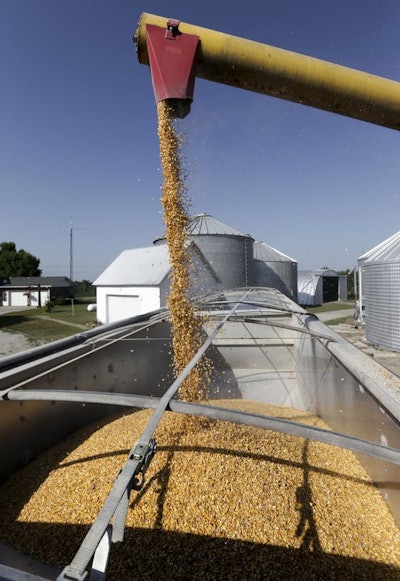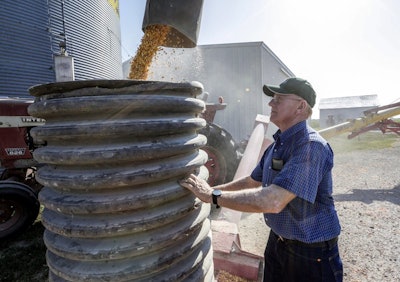
U.S. farmers struggle to adapt to fluctuating crop prices and other factors that have weakened their income in recent years due to the Trump administration’s biofuel, trade, and immigration policies.
The agriculture industry in the U.S. is going through one of the biggest changes in the last 100 years as it enters the energy industry, selling biofuels made from agricultural crops and other residues to oil refineries.
Strong market and policy incentives have led to an increased demand for corn ethanol as a biofuel feedstock. To meet this demand, many famers have reallocated their existing cropland into corn production.
The U.S. Renewable Fuel Standard (RFS) requires oil refineries to cover the costs of blending corn-based ethanol into gasoline. But the Environmental Protection Agency, after consulting with the energy department, has the ability to exempt small refineries in cases where compliance causes a “disproportionate economic hardship.” The waivers can save refiners tens or even hundreds of million dollars a year.
Recently, the Trump administration’s EPA has repeatedly ignored recommendations from the Department of Energy to reject or limit waivers to oil refiners seeking exemptions from the nation’s biofuels law. Under the direction of Scott Pruitt, the agency has issued more than two dozen exemptions in recent months—about triple the usual number granted under past administrations.
The Renewable Fuels Association estimated that the waivers have reduced the amount of ethanol refiners are required to blend by 1.6 billion gallons. The law currently requires refiners to blend 15 billion gallons of the biofuel per year.
 In this July 12, 2018 photo, an auger transfers corn to a grain truck at the farm of Don Bloss in Pawnee City, Neb. Farmers and agricultural economists are worried that president Donald Trump’s trade, immigration and biofuels policies will cost farms billions of dollars in lost income and force some out of business. (AP Photo/Nati Harnik)
In this July 12, 2018 photo, an auger transfers corn to a grain truck at the farm of Don Bloss in Pawnee City, Neb. Farmers and agricultural economists are worried that president Donald Trump’s trade, immigration and biofuels policies will cost farms billions of dollars in lost income and force some out of business. (AP Photo/Nati Harnik)The EPA has already exempted three of ten refineries owned by Andeavor, one of the largest refining companies in the U.S. These waivers could save Andeavor $50 million or more in regulatory costs for the company’s obligations under the biofuels law.
The Trump administration's willingness to issue waivers exempting petroleum refineries from having to blend ethanol into their fuels has led to an estimated 250 million bushels of corn going unused, which contributed significantly to lower corn prices.
“That’s a gut punch to Midwest farmers, to President Trump, and to the rule of law,” said Sen. Charles Grassley (R-IA).
Trump’s trade and immigration policies have also created challenges for farmers. U.S. tariff threats earlier this year against China, Mexico, Canada, and the European Union elicited quick retaliatory measures that depressed the prices of certain U.S. agricultural products, including corn, soybeans, and pork.
Don Bloss, who grows corn, soybeans, sorghum, and wheat on his farm in the southeastern Nebraska community of Pawnee City, said he's already seen a few neighbors quit farming as they struggled to make a profit even before the tariff battle began this year.
“They aren’t making money. One has said the banker is giving up on them,” said Bloss.
John Weber, who raises pigs and grows corn and soybeans with his son about 100 miles northeast of Des Moines said many farmers' budgets were already tight going into this growing season.
"Some were given the go-ahead for another year, but boy, you start looking at these lower prices and the extra costs that are out there now it gets tough. It just doesn't work," he said.
 In this July 12, 2018 photo, farmer Don Bloss examines a tall sorghum plant in his field in Pawnee City, Neb. Farmers and agricultural economists are worried that president Donald Trump’s trade, immigration and biofuels policies will cost farms billions of dollars in lost income and force some out of business. (AP Photo/Nati Harnik)
In this July 12, 2018 photo, farmer Don Bloss examines a tall sorghum plant in his field in Pawnee City, Neb. Farmers and agricultural economists are worried that president Donald Trump’s trade, immigration and biofuels policies will cost farms billions of dollars in lost income and force some out of business. (AP Photo/Nati Harnik)Per-bushel soybean prices have fallen 19 percent since early May to a 10-year low and corn is down more than 15 percent. At current prices, most farmers lose money on corn, soybeans, and pigs.
U.S. pork producers stand to lose more than $2 billion per year because of plunging hog futures prices, the result of the Chinese retaliatory tariffs, according to Iowa State University economists' projections.
Trump’s hardline immigration policies have also made it harder to recruit workers for pork producers, who have historically relied on immigrants for a third of their workforce.
“Skilled and unskilled foreign workers have been crucial to maintaining and growing the workforce and revitalizing rural communities across the United States,” said Jim Heimerl, a pig farmer from Johnstown, Ohio, and president of the National Pork Producers Council, an industry trade group. “We need more of them, not less.”
There's no sign of a quick resolution for the agriculture industry. The U.S. and China have threatened to impose 25 percent tariffs next week on $16 billion of each other's goods. And on Tuesday, Trump announced plans to impose 10 percent tariffs on an additional $200 billion in Chinese imports by the end of August. China said it would retaliate, leaving even more U.S. farm products at risk.
"If this continues and the USDA does not discover a way to helicopter in and drop buckets of cash into the corn belt this fall, then I would not be surprised if there are tractor parades going to DC at some point in the next year," said Scott Irwin, University of Illinois agricultural economist.
Agriculture Secretary Sonny Perdue has promised that Trump will restore farmer profitability but he hasn't specified how. Some economists are skeptical that the administration can come up with the billions of dollars necessary to cover losses.
"There's potential here for this to turn into the worst farm financial crisis since the 1980s," Irwin said.
 In this July 12, 2018 photo, farmer Don Bloss checks on the operation of an auger transferring corn on his farm in Pawnee City, Neb. Farmers and agricultural economists are worried that president Donald Trump’s trade, immigration and biofuels policies will cost farms billions of dollars in lost income and force some out of business. Bloss, who grows corn, soybeans, sorghum and wheat on his farm in the southeastern Nebraska community of Pawnee City, said he’s already seen a few neighbors quit farming as they struggled to make a profit even before the tariff battle began this year. (AP Photo/Nati Harnik)
In this July 12, 2018 photo, farmer Don Bloss checks on the operation of an auger transferring corn on his farm in Pawnee City, Neb. Farmers and agricultural economists are worried that president Donald Trump’s trade, immigration and biofuels policies will cost farms billions of dollars in lost income and force some out of business. Bloss, who grows corn, soybeans, sorghum and wheat on his farm in the southeastern Nebraska community of Pawnee City, said he’s already seen a few neighbors quit farming as they struggled to make a profit even before the tariff battle began this year. (AP Photo/Nati Harnik)





















